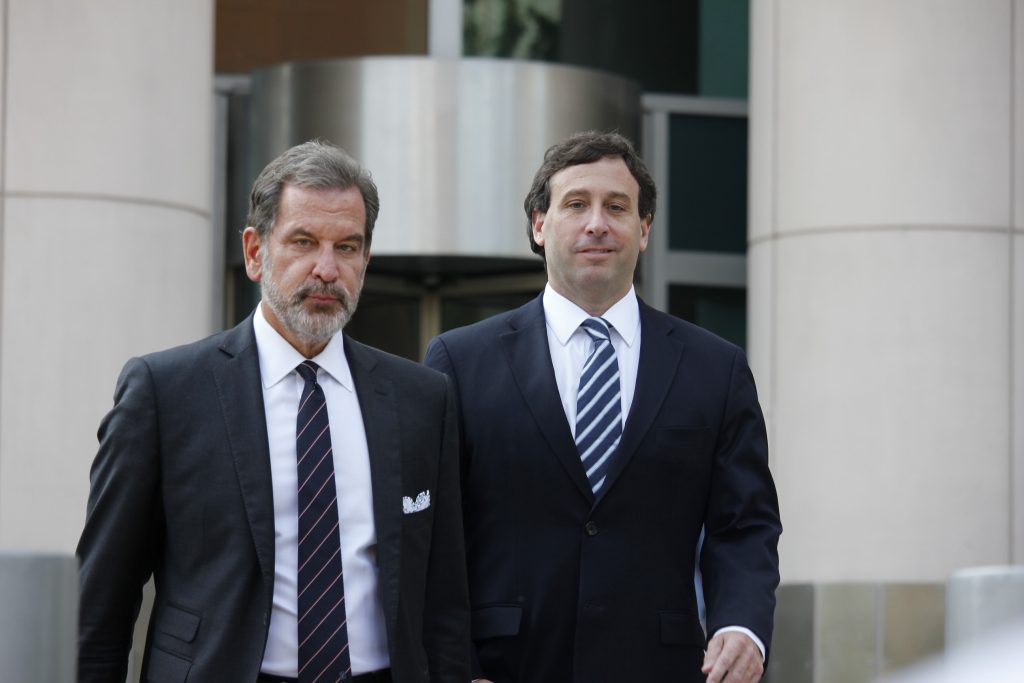By Gloria Lloyd
News Editor
glorialloyd@callnewspapers.com
One of Steve Stenger’s fellow former county executives wrote to the judge in his corruption case to ask that he serve no time in prison, but several South County residents wrote in asking for a tougher sentence.
Stenger, 47, pleaded guilty to three federal felonies May 3: bribery, theft of honest services and mail fraud. The Democrat took office in January 2015 and resigned as soon as his indictment was unsealed April 29, five days before his guilty plea.
U.S. District Judge Catherine D. Perry sentenced Stenger to 46 months in prison last week.
But before that, St. Louis residents from South County and beyond wrote to her giving their opinion on what she should do to Stenger. A few asked for leniency. Most asked her to throw the book at him.
Former County Executive Gene McNary, a Republican, asked for Stenger to serve no time behind bars for the crimes. McNary said that it was a waste of resources to imprison someone like Stenger, a nonviolent offender who has talents — he was an attorney and a certified public accountant before surrendering those licenses — that could be used to better society outside of prison.
McNary is a former public defender, prosecutor and four-term county executive. He served as head of the federal Immigration and Naturalization Service under President George H.W. Bush.
As part of McNary’s argument for leniency, he noted that the federal court in eastern Missouri has been a leader in probation alternatives, which “fix the harm that 50 years of mass incarceration has wrought on America,” McNary wrote. “USA v. Stenger is the right case for implementation of community confinement sentencing for non-violent offenders.”
McNary noted that he has met Stenger, and that the then-county executive appointed McNary as chairman of the county Charter Commission in January, before his criminal case. “Mr. Stenger made no demands of me and gave me no direction,” McNary said.
McNary’s reason for asking for leniency had “nothing to do with Stenger personally. As this story unfolds, we will continue to be offended by what amounts to corruption in government, but like Martha Stewart, Stenger is unlikely to be a danger to anyone or to reoffend.”
Besides, McNary went on, “Vengeance by incarceration is expensive and ineffective. In reality, the U.S. Bureau of Prisons will not flog or waterboard Mr. Stenger in revenge for his crimes. It will house him in the most minimum of penal facilities, a federal prison camp, at the cost of roughly $30,000 taxpayer dollars per year.”
Studies have shown that mass incarceration causes more crime than it prevents, McNary said, pointing to President Donald Trump’s signing of the bipartisan First Step Act to reform federal prison.
Imprisoning Stenger will take space and resources away from inmates who actually need education and training in order to assimilate successfully back into society, McNary wrote. He suggested supervised release with home confinement instead, or “intermittent incarceration.”
He also suggested community service: “Mr. Stenger can pay his debt to society and come to grips with all that he has lost and dishonored by ladling soup in one of St. Louis’ homeless shelters or working as part of a crew cleaning debris from a semi-abandoned north side neighborhood. This is far more effective and helpful to the community.”
Most of the residents who wrote to Perry were from South County, and they wanted to see the maximum sentence possible.
Mehlville Fire Protection District Board of Directors Secretary Ed Ryan wrote Perry without noting his elected office, saying officials who steal from the public should get stiff sentences. Perry later echoed that at Stenger’s sentencing.
“Steve Stenger was the man at the top of a corrupt and festering system of bullying and deceit. His type of cancer has brought disease to our community and distrust to so many honest businessmen and women in St. Louis County. He has admitted to being a common thief,” Ryan wrote. “The results of his greed have been a cancer for many others being pulled into his web of dishonesty. Therefore I am hoping for a severe sentence for Steve Stenger that clearly sends a message to all elected officials.”
Warson Woods Mayor Laurance Howe wrote of the “tug of war” between Stenger and municipal officials. He said he was “utterly shocked at the cavalier way in which Mr. Stenger conducted himself in governing St. Louis County and only when caught, was there any feigned attempt at contrition for his actions… Mr. Stenger, I believe, is an attorney and CPA and both professions call for character of the highest order, yet he saw fit to exploit his power and position for his own gain.
“To think or even contemplate Mr. Stenger, for whatever reason, might ‘get off’ with minimal punishment is a slap in the face to all who serve in local government. I politely ask you to keep in mind those who serve quietly and play by the rules when passing judgment on Mr. Stenger and his intentional acts of deceit.”
Oakville resident Louis Holtmann asked Perry if he could speak at Stenger’s sentencing, saying his longtime representative in Clayton “damaged the (county) for years to come.”
Concord resident Bonnie Trenholm asked Perry, “Please consider the most severe sentencing that can be given to Mr. Stenger. He truly misused his elected power and damaged every St. Louis resident that elected him.”
Oakville resident Milton Rudi re-sent Ryan’s letter along with his own comments: “A man of his position and background (lawyer) should not be allowed to manipulate the legal system to his advantage as he did with his governance of the county. He must face the music and fully experience the consequences of his actions.”
Longtime St. Louis city official Ed Bushmeyer said that he was shocked to see Sorkis Webbe Jr. associated with Stenger’s case. Webbe introduced Stenger to the businessman who was ultimately convicted of bribing Stenger, John Rallo.
Bushmeyer noted that Stenger was 8 years old when Webbe went to prison for “stealing an election.”
“In this age of social media, today’s lessons are quickly lost to the latest trending items,” Bushmeyer said. “Thus each generation needs to learn anew that illegal political activity cannot be tolerated and will have consequences…. A stiff sentence will also send a strong message that justice is indeed blind, and that anyone can expect equal treatment when sentences are handed out, regardless of whether they have friends in high places.”
But Fenton resident Robert Heintz wrote that he grew up looking to Stenger’s uncle, Tom Stenger — brother to Pete Stenger, the father of Steve — as a father figure.
As for that man’s nephew, Heintz wrote, “Steve Stenger has made some terrible decisions for which he will pay for the rest of his life. For this he will have to carry his cross. He also has some talents that could be shared with those less fortunate. I ask for leniency in his sentencing and hope you can find a way he will learn his lesson that will use his talent in helping others.”
